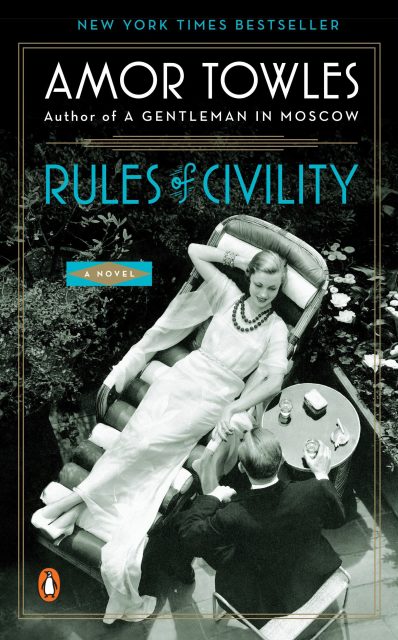
I wasn’t sure what I thought of this book at first. There wasn’t much of a plot: just some randomly connected incidents pulled together by the simple fact that they were happening to the same character. She goes to a nightclub; she eats dinner somewhere; she does this; she does that.
Then I started picking up on the allusions. This book is jam-packed with them. While there are some allusions to music and art, most of them refer back to novels. And then I started to see that the structure of the novel was itself an allusion to a classic novel we’ve all read. And then I started to see how Towles was taking yet another novel, itself a modern classic, inverting the structure, and placing on top of the allusion to the classic novel.
And then came this passage between a rich New York aristocrat (with a good and pure heart, though) and the narrator, a working-class girl born to Russian Jewish immigrants. The aristocrat is visiting the narrator’s apartment and notices the books:
“You’ve got a lot of books,” he said at last.
“It’s a sickness.”
“Are you … seeing anyone for it?”
“I’m afraid it’s untreatable.”
He put his briefcase and the wine on my father’s easy char and began circling the room with a tilted head.
“Is this the Dewey decimal system?”
“No, but it’s based on similar principles. Those are the British novelists. The French are in the kitchen. Homer, Virgil and the other epics are there by the tub.”
Wallace wandered toward one of the windowsills and plucked Leaves of Grass off a teetering stack.
“I take it the transcendentalists do better in sunlight.”
“Exactly.”
“Do they need much water?”
“Not as much as you’d think. But lots of pruning.”
He pointed the volume toward a pile of books under my bed.
“And the … mushrooms?”
“The Russians.”
This is, at its heart, a book about books, cleverly camouflaged as something else, but it is in essence a giant hat-tip to literature. That’s not all it is, of course, but that’s it’s organizing principle.
I won’t mention what exactly the classic novel and modern classic are — that would be a spoiler. I fear in mentioning them at all I’ve given too much away.
For all it has going for it, though, this novel is clearly a first novel: execution doesn’t quite meet conception. Perhaps Towles’s A Gentleman in Moscow, which I read first, set me up to expect too much. This is a solid novel, though, and an enjoyable read even if it does drag just a bit at times.
0 Comments